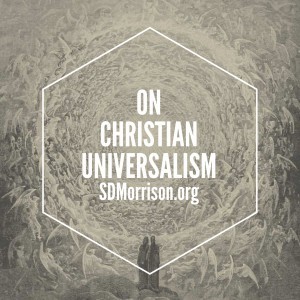On Christian Universalism
 It’s probably about time that I be perfectly clear about something. There are several articles on here that I’ve written that have induced the label of “universalist” or “universalism” onto me. 1 My last two posts were pretty “universalist” feeling, and one of them even started an argument on Facebook about universalism. 2
It’s probably about time that I be perfectly clear about something. There are several articles on here that I’ve written that have induced the label of “universalist” or “universalism” onto me. 1 My last two posts were pretty “universalist” feeling, and one of them even started an argument on Facebook about universalism. 2
So to be perfectly clear, I am not a universalist. Which means:
1. I do not believe that all roads eventually lead to God/heaven. Jesus is the only way.
2. I do not believe that eventually everyone will be saved no matter what.
Although, to be fair, I do believe it is right to have some level of hope for this to be the case. The early church seemed to hold onto “hopeful” universalism (see Gregory of Nyssa), but not “dogmatic” universalism. That is, they seemed to hold on to the possibility of universalism, without holding onto it in strict dogmatic practice.
Ultimately, from what I’ve found to be true in scripture and in the early church, is that whatever happens on the other side of death is a mystery. None of us have the perfect revelation into either heaven or hell. Therefore, mystery should remain on the forefront of our minds.
It is an error on both sides of the spectrum to hold dogmatically the belief in either 1) universalism or 2) eternal damnation. To hold dogmatically to a belief that is not held dogmatically in the scriptures is an error. The bible seems to speak with a two sided tongue. There are plenty of scriptures that deal with universalism, and there are plenty of scriptures that deal with an eternal hell. Which ones would you prefer to cut out from the bible? 3
Much of the confusion, I believe, comes about due to my belief in the universal atonement of Christ. That one died for all, therefore all died. 4
While I whole heartedly believe that Jesus has finished the work of salvation for all people in all times and places, that does not mean I also believe in universalism. All have been included into the death, and resurrection of Christ. While some may interpret this to mean universalism, it simply isn’t the case.
It’s an error to infer a causal connection between the death of Christ including all mankind, and the state of an individual after death in either heaven or hell. No such connection is implied in the scriptures.
It is because our western culture is so eschatologically obsessed that we have made this connection. We have tied the Gospel completely with hell and therefore whenever we think of the cross we also think of hell. We think that Jesus died only to save us from hell. When scripturally, this is hardly the case. There is much more that Jesus accomplished for us. To limit the cross to a get-out-of-hell transaction is to disgrace the cross. 5
I’ve written this to bring clarity to what I write here on this website. I’ve already been accused several times of universalism, and so I wanted to be perfectly clear as to what I believe. Ultimately I don’t think the church should hold dogmatically onto one belief over the other. The Eastern Orthodox church has it right in this area. They tend to be far more mystical, allowing for God to do whatever God wants to do in spite of our ability to categorize it or figure it out.
Mystery. Mystery is key here, at least for me personally.
So in clarity, I do reject dogmatic universalism. But, I also reject many of the modern ways that heaven and hell have become dogmatically assumed into our theology. I hold both views as possibilities. While ultimately I trust that God is good, and He knows what He’s doing far more than I do.
This quote from Robert Capon pretty much sums up what I believe in regards to Christian universalism.
Like this article? Help me expand my reach by sharing:
Notes:
See specifically: What if All Means ALL?, Did Adolf Hitler Go to Hell?, and Do Homosexuals Go To Hell?. These in particular have generated accusations of universalism. ↩Although the article never once mentioned heaven or hell. It was solely about atonement, and our view of the human race in light of atonement. Read it for yourself here. ↩Here’s a great quote along these lines ↩See 2 Corinthians 5:14 ↩On what the cross accomplished, click here. ↩


